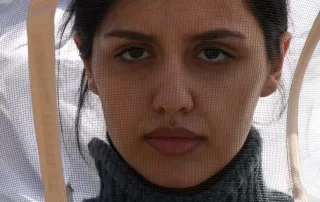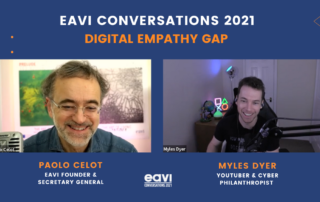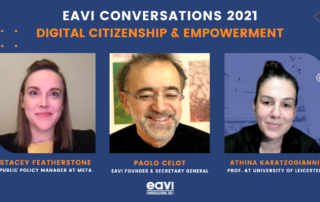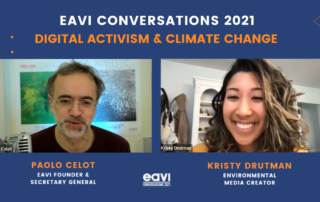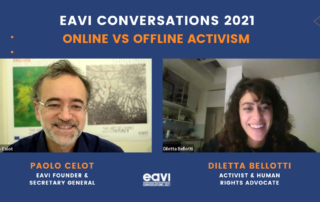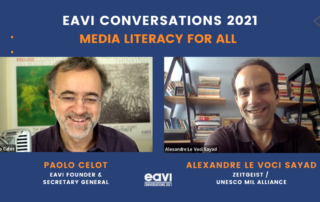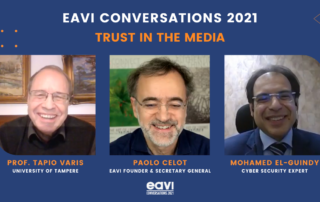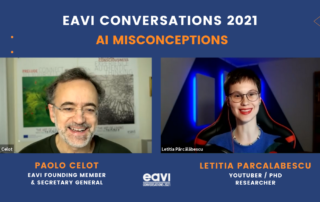The Devil Does Not Exist and Elihu Katz
Written by Marco Antonio Rodrigues Dias Member of the EAVI Advisory Committee In June 1975 - at the time I was at the University of Brasilia (UnB) and was dean of extension - I participated, as a specialist in communication policy, in an international symposium on "Mass communication in rapidly developing societies" - in Mashad, Iran, invited by the National Iranian Radio and Television (NIRT). My name had been suggested to the organisers by Elihu Katz who passed away on 31 December 2021 at the age of 95. Katz was one of the pioneers of [...]
Changing Media World Order
War in Europe and the pandemia and the climate change are globally challenging the existing world order. The continued rise of populism and authoritarianism has witnessed an attack on basic democratic freedoms and led to a divided political and social world. The mentality of a New Cold War is spreading in the world. Democracy and freedom have become ideological issues and propaganda in the media. The EU imposed a ban on “Russia Today” accusing it of systematic disinformation. The sanction means EU operators have been prohibited from broadcasting, facilitating or otherwise contributing to the [...]
What is Digital Culture? – An interactive workshop
EAVI recognises the importance of media literacy and citizenship at a European level with the goal to enable citizens to competently engage with media so that they can fully participate in democratic life. Our goals are ever more relevant as we increasingly become digital citizens faced with both the opportunities and challenges that this era brings. In this context, EAVI conducted the first piloting for the Digital Culture MOOC of the SIDE project on the 22nd of March, 2022, with the aim to: Enhance participants' current knowledge of digital culture; Teaching them new concepts [...]
Does the digital empathy gap exist? – EAVI Conversations
Conclusions drawn from the discussion with Myles Dyer – 9th of December (EAVI Conversations 2021) Whether some of us are conscious or not of the impact our online behaviours have, it is undeniable that they do influence what is happening in the real world. It seems more difficult though to relate whatever we do online to emotions and feelings, that is why it is said the internet causes dehumanization. Depriving someone of his/her human qualities, personality and dignity are relatively easy when we are protected by the distance of cyberspace and the pixels [...]
Digital citizenship and social movements: patterns and responsibilities – EAVI Conversations
Conclusions drawn from the discussion with Stacey Featherstone and Athina Karatzogianni – 7th of December (EAVI Conversations 2021) Conversations on digital citizenship are never predictable, as citizens’ rights and duties are many and the variables influencing their direct participation are countless. For the session with Prof. Athina Kataztogianni (Prof of Media and Communication at the University of Leicester) and Stacey Featherstone (Public Policy Manager at Meta), the focus has been the use of social media to foster digital citizenship and social movements. Digital citizenship shifted from being just about digital skills, to encompass also [...]
Climate change and social inequality – EAVI Conversations
Conclusions drawn from the discussion with Kristy Drutman – 2nd of December (EAVI Conversations 2021) Whenever we think about climate change we imagine natural disasters, temperatures and sea levels rise. The general discourse also focuses sometimes on its impact on humanity in the future, but rarely is mentioned that climate injustice is affecting more certain categories than others. Wealth and social inequalities are some of the causes leading low-income individuals and minorities (just to name a few) to be greatly affected by global warming and whatever comes with it. Kristy Drutman, the speaker in [...]
Activism: internet as a public space – EAVI Conversations
Conclusions drawn from the discussion with Diletta Bellotti – 1st of December (EAVI Conversations 2021) “Activism consists of efforts to promote, impede, direct, or intervene in social, political, economic, or environmental reform with the desire to make changes in society toward a perceived greater good.”[1] Numerous are definitions on the internet, but this is one of the few giving emphases to the concepts of change and the common good; aspects also highlighted by our host Diletta Bellotti, a human rights advocate and activist. After her session, we can probably rephrase the definition of [...]
Media literacy for all – EAVI Conversations
Conclusions drawn from the discussion with Alexandre Le Voci Sayad – 30th of November (EAVI Conversations 2021) Some topics are so complex that we cannot look at them from just one side. Therefore, we should take a multidisciplinary approach to tackle an issue or understand it better from different angles. Similarly, media literacy is a subject requiring a multidisciplinary approach to be fully comprehensible. In which way should we talk about media literacy for people to receive and understand our message? Teachers have an important role to play in this. They can use [...]
Trust in the media: demographic and geographical differences – EAVI Conversations
Conclusions drawn from the discussion with Prof. Tapio Varis and Dr. Mohamed El-Guindy – 23rd of November (EAVI Conversations 2021) Trust is a really complicated word to be defined, especially when it comes to media, as it encompasses psychological, political and emotional factors. Moreover, as different studies and research show, trust in the media may vary not only according to the demographics but also to the geographical area. We explored this matter in one of our sessions with Prof. Tapio Varis and Dr Mohamed El-Guindy, experts respectively in Europe and the Middle East. [...]
AI for good – EAVI Conversations
Conclusions drawn from the discussion with Letitia Parcalabescu – 18th of November (EAVI Conversations 2021) Futuristic movies generally depict technology as an independent entity from humankind, able to make decisions and ultimately have the capacity to rule the world and the universe. Whether it will go this way or not, if we allowed ourselves the possibility to just look at the present, we would notice that, despite its name, AI is not more intelligent than us, notwithstanding the alarmistic discussions about it. Our speaker Letitia Parcalabescu affirmed that “If intelligence has something to [...]

